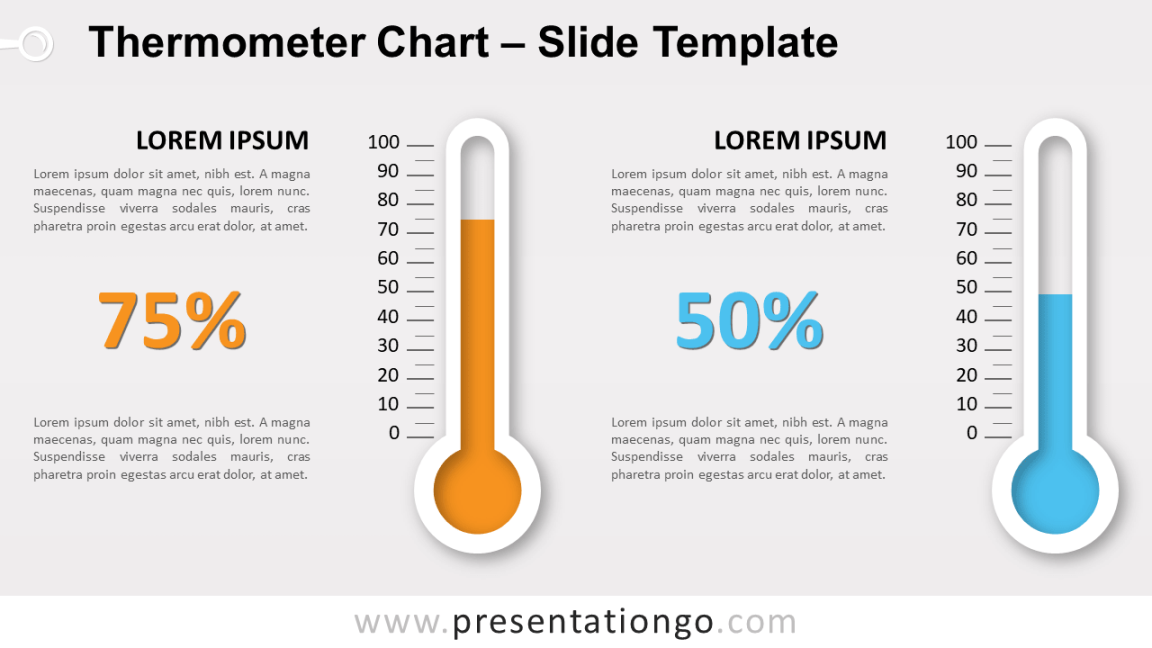A Thermometer powerpoint Template is a visually appealing and informative presentation tool designed to effectively communicate data related to temperature, measurement, and progress. It can be used in various professional settings, including scientific research, business presentations, education, and healthcare. To create a professional Thermometer PowerPoint Template, it is essential to consider the following design elements that convey professionalism and trust:
Color Palette

A carefully chosen color palette can significantly impact the overall professionalism and effectiveness of your Thermometer PowerPoint Template. Opt for colors that are visually appealing, easy on the eyes, and align with your brand or the topic of your presentation. Consider using a combination of neutral colors, such as white, gray, and black, with one or two accent colors to highlight key information or data points.
Typography
The typography used in your Thermometer Template should be legible, consistent, and appropriate for the intended audience. Choose fonts that are easy to read, even at small sizes, and that complement the overall design aesthetic. Avoid using too many different fonts, as this can create a cluttered and unprofessional appearance.
Layout and Composition
A well-structured layout and composition are crucial for creating a professional Thermometer PowerPoint Template. Use clear headings and subheadings to organize your content and guide the viewer’s attention. Ensure that the layout is balanced and visually appealing, with ample white space to improve readability. Avoid overcrowding slides with too much text or graphics.
Graphics and Visual Elements
High-quality graphics and visual elements can enhance the effectiveness of your Thermometer PowerPoint Template. Use relevant images, charts, and diagrams to illustrate your data and make your presentation more engaging. Ensure that the graphics are clear, well-defined, and consistent with the overall design theme. Avoid using low-resolution or blurry images.
Thermometer Design
The thermometer itself is a central element of the template and should be designed carefully to accurately represent the data being presented. Consider the following factors when designing the thermometer:
Shape: Choose a shape that is appropriate for the type of temperature being measured (e.g., Fahrenheit, Celsius, Kelvin).
Data Visualization
Effective data visualization is essential for communicating temperature-related information in a clear and concise manner. Use charts and graphs, such as bar charts, line charts, and pie charts, to present your data visually. Choose the appropriate chart type based on the nature of your data and the message you want to convey. Ensure that the charts are easy to understand and interpret.
Animation and Transitions
While animation and transitions can add visual interest to your Thermometer PowerPoint Template, they should be used sparingly and with caution. Excessive animation can be distracting and can detract from the overall professionalism of your presentation. Use animation to highlight key points or to reveal information gradually, but avoid using it for purely decorative purposes.
Branding and Consistency
If you are creating a Thermometer PowerPoint Template for a specific organization or brand, it is important to maintain consistency with your branding guidelines. Use the same colors, fonts, and logos throughout your template to create a cohesive and professional look.
Proofreading and Editing
Before finalizing your Thermometer PowerPoint Template, carefully proofread and edit the content to ensure accuracy and clarity. Check for spelling and grammar errors, and make sure that the information presented is consistent and logical. Pay attention to the overall flow and structure of your presentation to ensure that it is easy to follow and understand.
By carefully considering these design elements, you can create a professional Thermometer PowerPoint Template that effectively communicates your temperature-related data and leaves a positive impression on your audience.


